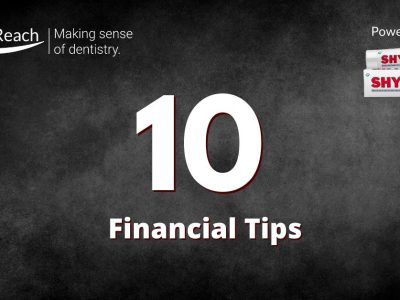Keywords student loans, dentistry, dentalgraduates, financial planning
Students and dental school graduates know the pain of student loans well. The American Dental Education Association estimates that in 2021, graduates had loans of around $301,583.
Whether you’re looking for that first associateship or striving for practice ownership, there are relaxed ways to pay off your loans. In the US, the federal government, states, and even local municipalities have created a host of programs that can ease the burden. Refinancing can help, too — as can a bit of creativity.

Read on for some possible ways to reduce your dental debt.
Consider refinancing options
As interest rates rise, it’s better to look at your loans to determine if you can lock in lower interest percentages before they go higher.
The ADA exclusively endorses the Laurel Road Student Loan Refinancing Program. Laurel Road offers ADA members a 0.25% lower rate than Laurel Road’s already low rates. There are no application or origination fees. You can start by checking your potential rate in just 5 minutes, with no hard credit pull.
Take up public health dentistry
One of the best-kept secrets of dentistry is the benefits of working in public health. While you may think of public health as military service, your options are actually much broader.
Dentists in these services earn a base salary with competitive compensation and benefits — and many offer lucrative enlistment bonuses and other perks. For example, Army dentists may be eligible for a signing bonus of up to $150,000 and may receive 100% loan forgiveness! Check if similar perks are provided in your country.
At the federal level, nearly 5,000 dentists work for the US Public Health Service, the Department of Veterans’ Affairs, or the military. Dentists in the US Public Health Service Commissioned Corps serve in the
- Indian Health Service
- US Coast Guard
- Federal Bureau of Prisons
- National Health Service Corps
- Assisting in public health responses to disasters.
Learn more about working in federal dentistry
The National Health Service Corps administers many public health programs throughout the country and was recently awarded nearly $100 million in American Rescue Plan funds to distribute to state loan repayment programs. Through the Corps, medical and dental professionals may be eligible for up to $50,000 per year if they commit to working for two years in underserved areas. And these “underserved areas” can be almost anywhere, from busy urban areas to rural clinics.
Many public health dentists work in one of the nearly 1,400 Federally Qualified Health Centers (FQHCs), which are dedicated to improving access to care for underserved populations. Working in FQHCs can be incredibly rewarding, as patients are never turned away due to a lack of insurance or funds. FQHCs pay a salary and benefits, and many offer (sometimes quite significant) loan repayment perks, often through the Health Resources Services Administration (HRSA).
Public health jobs offer a very good way of performing dentistry without prioritizing production. You don’t have that pressure in work. FQHCs always need qualified dentists, so if you’re considering a change, consider looking into FQHCs. This can also be a great option after retiring from a private practice!
Check the Public Service Loan Forgiveness Program
Public Service Loan Forgiveness (PSLF) is a federal program designed to encourage students to enter potentially low-paying careers like firefighting, teaching, government, nursing, public interest law, the military and religious work. The U.S. Department of Education accepts these applications. Even if you can only get $10-20K in forgiveness, it is worth taking the time to fill out the paperwork.
The PSLF Program may forgive the remaining balance on your Direct Loans after you have made 120 qualifying monthly payments under a qualifying repayment plan while working full-time for a qualifying employer. However, the program’s time-limited changes expired October 31, 2022. But borrowers who work in public service can still apply for forgiveness.
If you’re considering buying, talk to lenders!
Graduates assume that their student loans will prevent them from being able to purchase a practice. However, this assumption is most often quite false!
Banks are typically willing to work with dentists who want to purchase a practice. After all, they know that dentistry is a stable profession. If your credit is good and you have been diligently paying down your loans on time, banks are very open to exploring a practice loan, especially if you have proof that you can handle the workload.
The key is to talk to them! If you’re considering a purchase, talk to at least three banks. Bankers are happy to have these initial conversations and can give you guidance on:
- Things you can do to strengthen your application, such as improving your credit or
- providing production reports to prove that you can handle ownership.
- How much you may be eligible to borrow, assuming the practice financials will support the practice,
- the current loan climate, including what to expect from interest rates and loan types.
Work for a small-town or rural associateship
I’ve worked with many young dentists who discovered that taking a well-paying associateship for 2-3 years in a low cost-of-living area was a great way to pay down their debt. Several of them have said, “I can live anywhere for two years!”
You can sign a two-year contract right out of dental school that included a comfortable salary and free housing if she was willing to work in a small town, also called as ‘rural internship’. This is usually a mandatory practice in government setups.
If you want to pay your loans off fast without being financially strapped, go rural. You will do way better in a rural practice than in a corporate or a city practice. If you look at the numbers, you will come out ahead in a rural practice.
I refer to living in a low-cost area while making a dentist’s salary as “geographical arbitrage,” because that moving to small-town allows you to buy a practice with much lower overhead and less expensive housing. You can quickly pay back your loans and then enjoy three-day weekends filled with travel and hobbies, to all extravagant cities around.
Get creative
If you have a long term care facility near you, consider approaching the administrator to see if you can supplement your income by providing oral health evaluations or training to the staff. You can designate these funds towards your student debt and build up your reputation in the community at the same time. As an added bonus, you may qualify for a portion of the NHSC funds (and up to $25,000 in loan repayment) if this facility supports an underserved population.
Don’t forget about dental schools and hygiene programs that may need instructors. Academic institutions are often looking for dentists to instruct the next generation of professionals — and are willing to provide some loan repayment as a part of their compensation! You can often do this full or part time, whichever fits into your lifestyle.
Don’t be stupid!
Finally, no matter what you do, BE SMART with your money! Be sure to follow basic principles of sound money management and live within your means. The ADA offers a guide on financial planning that reviews some of the basic premises of money management. Self learning about finance is a necessity and never goes waste. One dentist couple paid off all their loans and saved $1 million in 8 years by following the Financial Independence, Retire Early (FIRE) lifestyle, empowering them to consider retirement before turning 40.
The worst way to pay off your loans is by ignoring them! Instead, take a deep breath and review these tips — then consider what’s right for you and your situation.

















Comments